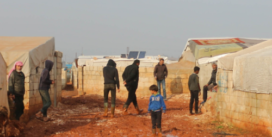- Fall Newsletter, 2025, Issue 15
- Using International Online Learning Modules to Engage Students in the Study of Critical Global Issues
- Upcoming Book Launch: Hearts of Freedom
- Announcing winners of the 2025 CARFMS Essay Contest
- The New York Declaration for Refugees and Migrants and its two Global Compacts: Addressing the Symptoms or the “Root Causes” of Forced Displacement?*
2021 CARFMS EC E-Vote
Position: Student Affairs Officer (1)
Candidates
1. Rabindra Chaulagain, Alberta
Gender: Male
Biography:
Rabindra is a Ph.D. candidate in Cultural Social and Political Thought at the University of Lethbridge. He taught at Tribhuvan University and various colleges in Nepal before he migrated to Canada. He holds degrees in Humanities and Social Science in Nepal and Canada, including BA and MA in English literature from Tribhuvan University, MPhil in English and Cultural Studies from Pokhara University and an MA in Cultural Analysis and Social Theory from Wilfrid Laurier University. Rabindra has been working on a contested border crossing project with Dr. Julie Young. His research spans a wide range of social issues, including race, gender, migration, bio/necropolitics, critical theory, and critical border and refugee studies.
Candidate’s statement:
It is my great pleasure to be a part of CARFMS to work in a team of scholars concerning the issues of global displacement and refugee studies. Since my areas of research interest include refugees and forced migration studies, my association with CARFMS as the Student Affairs Officer contributes to the team and objective of the organization through research and volunteer activities. As part of the position’s responsibilities, I am committed to working on students’ interests and concerns by creating a space to disseminate their research.
2. Carla Cabrera Restrepo, Ontario
Gender: Female
Biography:
I am a Master’s student in Public Policy, Administration, and Law and a candidate for the graduate diploma in Refugee and Migration Studies at York University. I am deeply passionate about human rights, refugee and migration issues and it has led me to become an executive member of the CRS Student Caucus, participating in the yearly student conference. Before COVID, I volunteered with the Centre of Spanish Speaking People, helping refugees integrate into Canada by helping them get the resources they need (English classes, employment). I have also collaborated on a student research project with the UNHCR and the Experiential Learning Program in 2020, focusing on the impact media had on refugee laws and policies in Canada.
Personal experience of forced migration:
My personal experience of forced migration is through growing up in an immigrant household. My father was a refugee from Venezuela who fled for his safety for his political involvement against the 1992 attempted coup. His experiences and his stories shaped me into who I am by wanting to focus on other refugees and collaborate with stakeholders and policymakers to ensure they can overcome barriers and receive proper services to rebuild elsewhere. My father’s story of overcoming barriers and coming to a new place without anything and building a life and a family has made me work harder to ensure I take all the opportunities available to me because he could not.
Candidate’s statement:
Hello, firstly I would like to thank Professor James C. Simeon for nominating me for the position of Student Affairs Officer, it is an honour. As a first-generation university student, I have had to overcome barriers. I want to focus on disseminating refugee and migration issues to students so they can become informed and drive change. I believe that nurturing relationships between students who are interested in advocating for Canadian refugee research and scholars, policymakers, and other various advocates will help to push forward to affect policy change in refugee and migration in Canada and bring attention to other refugee and forced migration issues around the world.
3. Rachel McNally, Ontario
Gender: Female
Biography:
Rachel McNally is a PhD student in Political Science at Carleton University in Ottawa, with specializations in International Relations and Public Policy. Her research focuses on Canadian refugee resettlement policy, including private refugee sponsorship, refugee sponsorship in rural areas, and the Blended Visa Office-Referred (BVOR) and Joint Assistance Sponsorship (JAS) programs. For her dissertation project, working with Professor James Milner, Rachel will be studying the historic evolution of Canada’s resettlement policies for refugees with disabilities. She started her PhD in 2020 after completing her Master’s degree, also at Carleton, and an undergraduate degree in Politics at Acadia University in Nova Scotia, the province where she was raised. Her chapter “The Blended Visa Office-Referred Program: Perspectives and Experiences from Rural Nova Scotia” was published in the 2020 book Strangers to Neighbours: Refugee Sponsorship in Context by McGill-Queen’s University Press. At Carleton University, Rachel enjoys being a Teaching Assistant for migration-related courses and has worked to organize the Migration Student Research Conference. Rachel is also the Knowledge Mobilization and Translation Officer for LERRN, the Local Engagement Refugee Research Network, and a Research Assistant with the project “From Anecdotes to Evidence: Research-Based Recommendations for Supporting Rural and Remote Sponsorship” funded by Immigration, Refugees, and Citizenship Canada, and hosted at the Prentice Institute at the University of Lethbridge. In addition to research, Rachel has been a refugee sponsor in three sponsorships, and she completed an internship at UNHCR’s Resettlement and Durable Solutions Unit in Ottawa.
Candidate’s statement:
I would enjoy becoming more involved with CARFMS during my PhD as I consider it to be the academic community most aligned with my own research. I believe CARFMS can play an important role in connecting scholars and emerging scholars in Canada and beyond working on forced migration issues. I enjoyed attending the CARFMS conference in 2019 and presenting at the conference in 2021. I would like to work with CARFMS on connecting further with students, especially giving students more opportunities to present their research.
